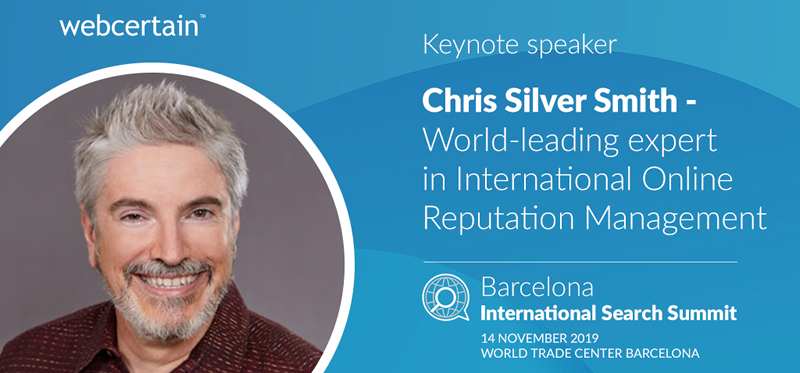
The International Search Summit Barcelona is taking place on 14 November 2019. Covering a wide range of international search marketing topics and challenges, the conference is highly recommended for digital marketers managing international websites and running global campaigns.
We’ve asked our keynote speaker – Chris Silver Smith, CEO of Argent Media – what attendees will gain from his talk and why people should attend the International Search Summit. Here’s what he had to say!
Why is online reputation management such an important topic?
The reputation of companies is increasingly looked at by potential clients and customers. People will look up your brand online when they first hear about you, and just like in the real world, first impressions make a big difference in how people perceive you and interpret your identity. So, if there are negative materials that appear when people search for you online, this affects their impression of you, which affects whether they want to work with or buy from you.
Would you say online reputation management is relevant to all businesses, regardless of their size or industry?
Yes, definitely. You hear the big stories involving the reputations of well-known brands and celebrities, but even businesses and people who are not well-known are very much affected by this. However, oftentimes, until businesses have a problem, they don’t realise they have that vulnerability.
What are the most common consequences of a business not paying attention to their online reputation?
A business that doesn’t pay attention to its online reputation, or doesn’t have much of an online presence, tends to be wide open to attack. This is because anything negative that’s posted about them can appear very rapidly in the first page of the search results, and people will perceive that they’re not a great organisation to do business with. Those sorts of things can impact a business’ bottom line really intensely. I’ve seen revenue drop-offs as high as 50% or even higher. It goes to show that it’s super-important to have a robust reputation online, and to do a little bit of work proactively to try to have a robust reputation so that you can have a little bit of insulation against anything negative that could appear online.
Anyone can write anything online, which inevitably leads to some of this content ranking in the search results. What steps should businesses be taking to protect themselves?
The first and best step is to have quite a few different assets online that represent your business. Having a well-maintained and well-optimised website is a must. After that, there are a number of different social media websites that tend to rank prominently. Also, there are online business directories, trade associations, professional associations, chambers of commerce, etc. that you can have profiles with, which tend to rank very well for brand name searches on the search engines. Setting up these types of assets ahead of time gives you a little insulation against any negative content that might emerge online later.
If you notice some reputationally-damaging content ranking on the first page of the search results for your brand name, what steps can you take to try and fix that as quickly as possible?
First of all, is it something that you can resolve through diplomacy – i.e. talking to the person or website who posted it? Is it something that they would be likely to remove? Is it a mistake, and if so, if you bring it to their attention, will they correct it? If it’s something straightforward like that, you might be able to resolve it rapidly simply by communicating with them.
If that doesn’t work, is it something that you have a legal case against? Could you go to court and get a court order stating that this should not have been posted and get it removed? Google will respond to any legal removal requests that you can obtain.
Or is it something that is an invasion of privacy or harassment or copyright infringement or trademark infringement? You might be able to go to the company or platform that’s hosting that content and say: this goes against your terms and policies, please remove it. Many companies will acknowledge that request and deal with it for you.
If none of that works, then you may just have to manage the damage through other methods. You could take out online ads, so that you have at least an ad showing up at the top of the search results, which should hopefully push the negative content down a little bit on the first page of the search results, thus making it less visible.
Is it something that you want to issue a statement about? You could involve public affairs and business communications personnel and put out a professional, well-formed statement that represents your side of the story.
There’s also search engine optimisation, where you try to enhance the rankings of all the positive content online and create new positive content so it can out-rank any negative content. This is where it’s useful if you’ve already done some proactive online reputation management in terms of promoting yourself online and having assets to use in such a case.
You mentioned that you can ask Google to remove certain things if they’re not correct. However, we’ve recently had a ruling in the EU which said that the right to be forgotten doesn’t apply outside of Europe. What is the significance of this and how does it affect the issue of online reputation?
It is significant and any company that works internationally may be affected by this. The ruling means that negative content could be removed in Europe under the right to be forgotten, but it would still appear throughout the rest of the world. So, if your company works internationally, you have to be aware of what your reputation looks like in search results across the world and you have to follow online reputation best practice. You need to create a really robust online identity to try to insulate yourself against any negative content that could show up, e.g. by having one or more websites and social media accounts that are developed sufficiently so as to appear prominently in the search results.
It could be argued that even if you get a negative comment online, the way you handle it is actually what’s important. If a business responds quickly and professionally, this can negate the damage of a negative comment.
That’s very true. I have seen cases before where a business has had a complaint on a site such as Yelp and the owner has gone in and responded in a very sensitive and professional manner, apologising for their poor experience and perhaps inviting them back and giving them service free of charge. And then sometimes the customer later goes back and posts an update to the review, changing that negative review into a positive one. That whole story appearing with their review is so much more compelling than just having a list of very sterile, purely positive reviews. Industry research shows that having perfect reviews is actually not as effective as having just a slightly less perfect review, such as 4 stars instead of 5. You get better sales and better trust because imperfection is seen as realistic and not “fake”.
You will be presenting the keynote at International Search Summit Barcelona next month, talking all about this topic. What can attendees look forward to in your session?
I am hoping to relay some interesting stories from the reputation field. I have had a number of interesting clients and cases for a number of years now, that in some instances are fairly dramatic! I’ve represented reformed criminals, some of the largest corporations in the US, celebrities and religious groups. So, I hope to share some interesting and compelling stories, and in addition I’m going to give some actionable strategies and methods, particularly regarding SEO and social media management and how you can derive benefit in the search results and how you can obtain better rankings. I’m also going to incorporate a little bit of online reputation that involves paid search advertising.
Feeling tempted? You can still buy tickets for International Search Summit Barcelona here! Early bird rates end 15 October 2019.







